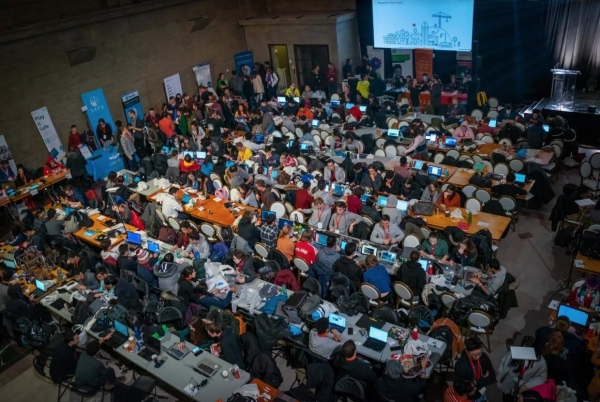From Feb. 2 to 3, students from across Canada and the United States hunched over their laptops at McGill’s annual McHacks competition. With cash awards and Nintendo switches at stake, the participating ‘hackers’ had 24 hours to program an original project.
Students have organized and run the competition since 2013, with this year’s committee being staffed by 26 organizers and 60 volunteers.
As Canada’s oldest collegiate hackathon, McHacks sets the scene for the Canadian hackathon community. Many Canadian universities have followed in its footsteps by organizing hackathons of their own, but McHacks continues to differentiate itself.
“We try to make our [hackathon] very beginner-friendly,” Kyle Rubenok, co-director of McHacks 6, said. “It’s a really great way to [get] someone from zero to something tangible in a weekend, and there’s not really many ways you can learn something that quickly.”
The breadth of projects this year ranged from tackling imminent world issues to a computer game that generated a recorded meow every time an attendee clickled an animated cat.
One of this year’s top projects was ‘H2Onow,’ a web application that gives live updates on water supplies to populations that have to walk long distances for their water.
“[We] are looking [for] creativity, completeness, technical difficulty, and originality,” Kayla Branson, the director of McHacks 5 and a judge at this year’s competition, said.
Hackathons help competitors develop a wide range of useful programming and presentation skills. The breadth of experience which the event provides participants with has led them to suggest that the events become mandatory in computer science curriculum.
“McGill is mostly theory,” Kevin Gi, U1 Engineering, said. “There’s not really a lot of practical things we learn on assignments.”
In a team with three other software engineers, Gi created a 3D-printed catapult while also designing a software program that can throw an object using projection data.
“I already learned more in 24 hours than I did the entire last semester,” Edwin Pan , U1 Engineering, and a teammate of Gi’s, said.
Hackers appreciate hackathons as opportunities to develop their own skills.
“Computer science education around the world has a lot of different forms,” Rubenok said. “McGill takes a very theoretical stance, Waterloo takes a more practical approach, [and] Queens is somewhere in the middle. Hackathons are a chance for students to take something and practically apply it in a short amount of time with no real limitations on resources and plenty of support.”
Diversity at hackathon events further bolsters their importance to tech education. The disproportionately low representation of women in STEM is commonly linked to Imposter Syndrome, a psychological pattern of believing one does not deserve their education or job, one does not belong, and ones’ accomplishments are the result of luck.
“I’m definitely battling [Imposter Syndrome],” Dunja Tomic, a second-year student at the University of Waterloo, said. “It’s been an uphill battle I’d say, but the more I learn, and the more I get myself out to events like this I find that I belong here.”
McGill’s computer science program is one of the most gender-diverse in North America, with a 36 per cent enrollment rate for female-identifying students. This year’s McHacks committee made gender diversity a priority when selecting applicants.
“We wanted McHacks to represent the excellent diversity McGill Computer Science has,” Rubenok said. “We worked very hard to promote McHacks to [diverse] groups in computer science.”
While the committee fell short of its goal of a 50-50 gender split of hackers, 31 per cent of the participants were female, compared to 19 per cent in 2018.
For the McHacks of years to come, Rubenok hopes the competition can become a gateway for more non-computer science students to access the tech industry.
“We want to encourage employers to value the diversity of opinions and skill sets,” Rubenok said. “Events like hackathons allow students from non-traditional backgrounds to still interact with these companies and expose their skills and CVs.”








